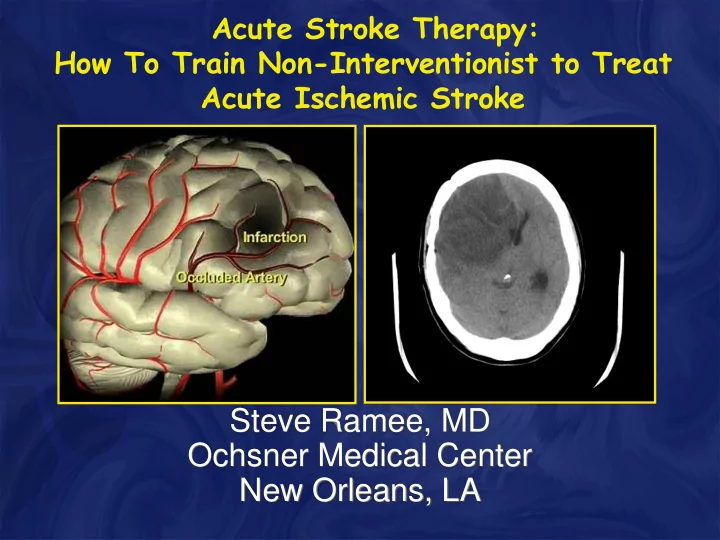

Acute Stroke Therapy: How To Train Non-Interventionist to Treat Acute Ischemic Stroke Steve Ramee, MD Ochsner Medical Center New Orleans, LA
Disclosure Consultant: Neurointerventions 2
Time is BRAIN! “The typical (stroke) patient loses 1.9 MILLION neurons each minute in which stroke is untreated.”
Ischemic Penumbra
So....we want to SAFELY restore brain perfusion as quickly as possible “Get the Damn Artery Open” • Treatment options • Intra-arterial thromboysis • Balloon angioplasty • Clot retrieval • Stenting
Stroke Treatment ❖ Less than 5% get treated at all ❖ Doesn’t get to the clot in major stroke ❖ Success rate is low PS: Didn’t work for STEMI either!
Mechanical Approach • Why is it our first choice? • Higher recanalization rates • Low SICH rates • 17% re-occlusion rates after IAT
Catheter Based Options ❖ Penumbra* ❖ Merci* ❖ Solitaire* ❖ Thrombus disruption ❖ Wire manipulation ❖ Balloon angioplasty ❖ Intracranial Stents
NeuroSpecific Devices Clot Retrieval
Concentric Retrieval System
Doctors don’t know where to send stroke patients! 15 yo A+ athlete Had a stroke before practice and couldn’t see well. Coach told mom. Mom took him to a neurologist who confirmed the stroke and recommended he see a stroke specialist. First appointment: 2 weeks.
3 days later... Brother found him on floor. Mother brought him to ER #1 with locked-in syndrome. MRA confirmed the problem. Transferred to Hospital #2 after 3 hours. Called us (hospital #3) 42 hours after stroke. When he arrived, all he could move were his eyes.
R vertebral artery
Thombus Snared on Third Attempt
Stephen Ramee, MD
What Does This Patient Teach Us? Stroke is a 911 Emergency! There is a real need Comprehensive Regional Stroke Centers. Telemedicine, Neuro-ICU, Stroke Neurology, 24/7 MRI and CT Perfusion, Angioplasty, Rehab. MOST hospitals offer only very limited stroke treatment. Every ER, hospital, EMS service and physician’s office should have a plan if they diagnose acute stroke. Interventional Cardiologists can assist in this effort.
Self-Expanding Neuro Stents • More flexibility with open cell design • Low radial force during deployment…no post dilitation • Increased safety profile …No vessel rupture • Designed specifically for the cerebrovasculature • Delivered to target area - success rate of > 95% Wingspan- open cell Enterprise- closed cell Henkes H, Miloslavski E, Lowens S, et al. Neuroradiology. 2005;47:222 – 228.
Hospital Course Dense hemiparesis persisted for 48 hrs, followed by a rapid resolution. At one month, had complete recovery of language and only mild fine motor deficit. At two years back in school with his classmates. Wears a brace on his L leg because of mild foot drop.
Solitaire Temporary Stent Stephen Ramee, MD
Soft radiopaque tip TREVO device Distal tapered transition Cell geometry – for integration of clot in curved vessels Proximal tapered section – for smooth withdrawal and easy re-sheathing Radiopaque proximal marker
Cryotherapy: Can we prolong the window for stroke Rx? Level 2b indication for OOH arrest
SUMMARY: Stroke Technique Stroke is a medical emergency Time is Brain! If CT/CT perfusion shows brain viability, open the artery as quickly and safely as possible. Lysis, balloon, clot retrieval, stenting Avoid guidewire perforation and vessel rupture .
Conclusion: How can we make stroke treatment more effective? Educate our citizens about the signs and symptoms of stroke: TIME IS BRAIN!!! Develop regional stroke centers and educate EMS and health care providers how to access this network emergently: BRAIN ATTACK/911! Now that Stentrievers are available in the USA, Interventional Cardiology Manpower can assist in getting Rapid Door to Patency.
STROKE
Recommend
More recommend